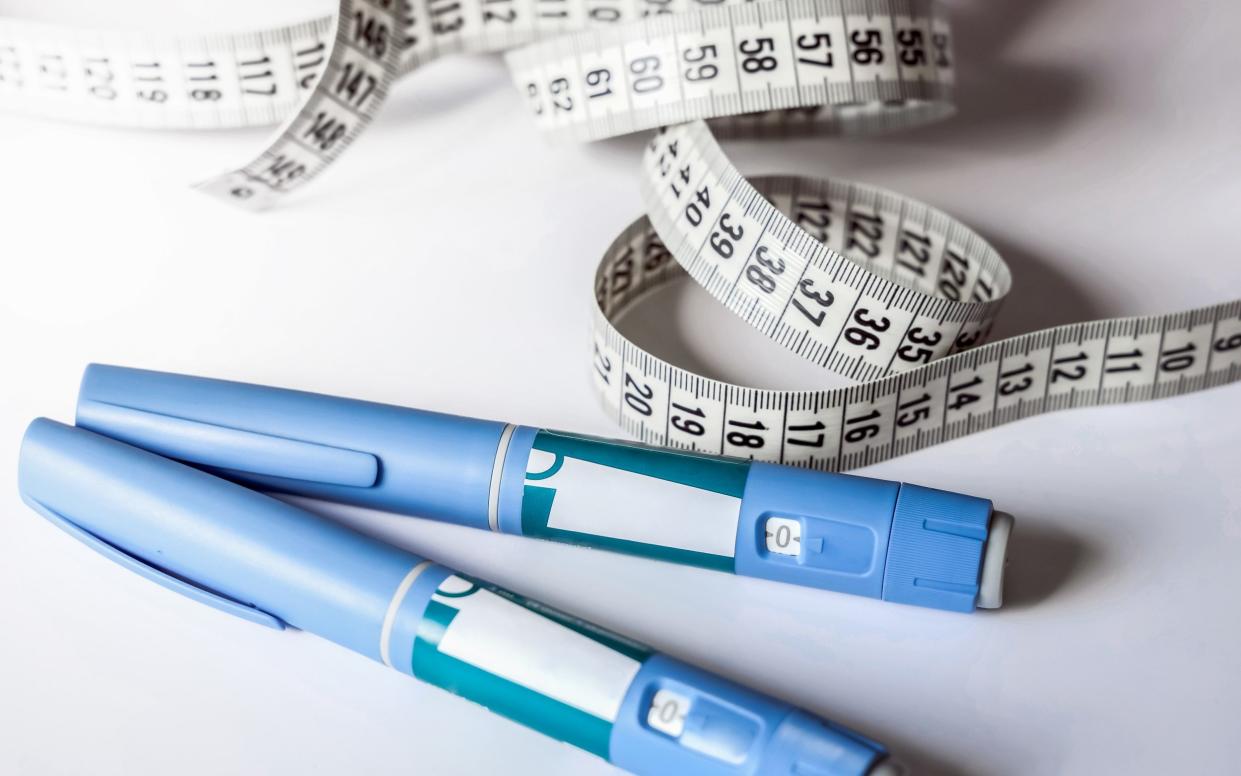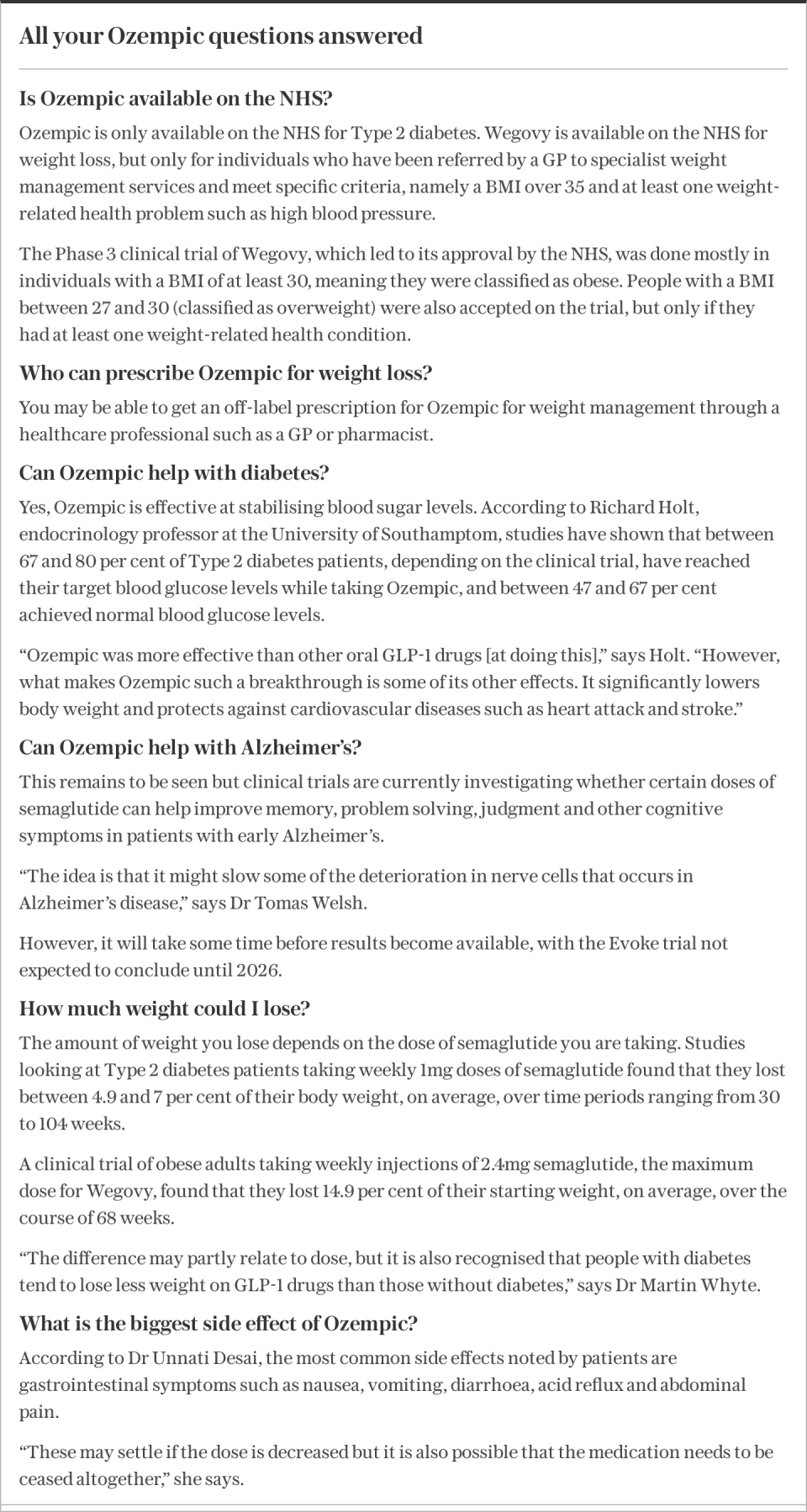Breakthrough study reveals how to keep off the pounds after stopping weight-loss jabs

Slimmers who come off weight loss jabs can keep the pounds off – if they wean themselves off the medicine slowly, a trial has found.
Until now, those prescribed the radical treatments have been warned that they may have to stay on the drugs for life – or see their weight bounce back up.
The jabs have been shown to cause major weight loss – with average loss of more than 15 per cent of body weight over 68 weeks.
However, studies found those on the drug semaglutide, known by the brand names Wegovy and Ozempic, which is prescribed for diabetes, put two thirds of the weight they lost back on, once they stopped being prescribed the jabs.
Those findings sparked fear in those taking the jabs, particularly as guidance for the NHS only recommends them to be prescribed for a maximum of two years.
But the new trial suggests that with careful management of the dosage, and changes in diet and lifestyle, weight gain after coming off the drugs can be avoided.
Dieters were also able to lose weight despite being put on a far lower dose of the drugs to begin with – saving them from uncomfortable side-effects.
The injections work by mimicking hormones to reduce feelings of appetite and hunger and increase feelings of fullness.

Normally, the dose is gradually increased as patients get used to the treatment.
But the study of 2,246 Danes, with an average starting weight of just over 15 stone (210 lbs), closely monitored the doses which patients were put on, only increasing it if slimmers had stopped making progress.
At 64 weeks, average weight loss was 15 per cent - more than two stone (28 lbs) - despite the fact dieters were only on around one third of the standard dose.
The lower doses also reduced the risk of the side effects, such as diarrhoea and vomiting, which are associated with the drugs.
Weight loss continued as the dose was being tapered down over an average of nine weeks, with an average loss of 2.1 per cent over the period.
And even when the jabs were stopped entirely, weight remained stable for the next 26 weeks for the majority of those tracked.
Encouraging findings
Researchers said the findings, presented at the European Congress on Obesity in Venice, were a “really encouraging” breakthough and could ensure that sought-after stocks of jabs go further.
Lead researcher Dr Henrik Gudbergsen said: “This was really encouraging to see in this global fight against obesity. We used to think these drugs are forever or you put all the weight back on. Now we know that’s too simplistic.”
The study was by Embla, a digital weight loss clinic, which enrolled 2,246 members with an average body mass index (BMI) of 33.2.
Dr Gudbergsen, Embla’s chief medical officer, said: “The dose really doesn’t matter at all. They lose the same amount of weight regardless.
“That is really important in that we can achieve a personalised dose and help minimise side effects and lifelong drug dependency, which is what patients are interested in.”
In the trial, some 353 patients were helped to gradually reduce their semaglutide dose over nine weeks after they had reached their target weight. During this period they lost an extra 2.1 per cent of body weight.
In total, 240 participants decided to taper down the dose and then stop altogether.
Of these, 85 participants provided data six months later showing they had maintained a stable weight, even dipping slightly, with another 1.5 per cent of weight lost.
A further 46 restarted semaglutide after stopping because they noticed small weight gain.
Celebrity injections
The jabs have been popularised by a host of celebrities, including Oprah Winfrey, Elon Mask and Jeremy Clarkson.
Earlier this year Stephen Fry said he gave up on Ozempic after he was left vomiting up to five times a day.
The jabs mimic the action of a hormone called GLP-1 to reduce appetite, slow the release of food from the stomach and increase feelings of fullness after eating.
Prof Jason Halford, President of the European Association for the Study of Obesity, said: “This sort of personalised approach requires specialist weight management services of which we don’t have enough. There is a lack of understanding of obesity as a disease in primary care.”
Prof Naveed Sattar, of Glasgow University, said: “What is in the abstract is really encouraging but we need to confirm this in bigger trials.
“People feel less heavy and have improved their activity levels. Anecdotally we have seen people make big changes in their lives and so they don’t need as much drug to maintain that.
“Some people have fundamentally changed their lifestyles so they can keep the weight off.”
Prof Alex Miras, clinical professor of medicine at Ulster University, said finding the right dose was crucial.
The obesity expert said: “We use the parallel for high blood pressure. Once someone is on a good dose for them we don’t start experimenting with the dose, they just carry on with it.”
He said the drugs were evolving to become more effective with fewer side effects.
Experts said it was particularly important to avoid weight gain because fat tended to replace lost muscle.
Some trials have found that as much as 40 per cent of the weight lost via jabs is made up of muscle.
Prof Miras added: “Unfortunately when the regain takes place there is more fat than muscle added. That’s bad because muscle is very important for energy expenditure.
“It makes it more difficult to lose weight in the next attempt. You are basically sabotaging future weight loss.”

